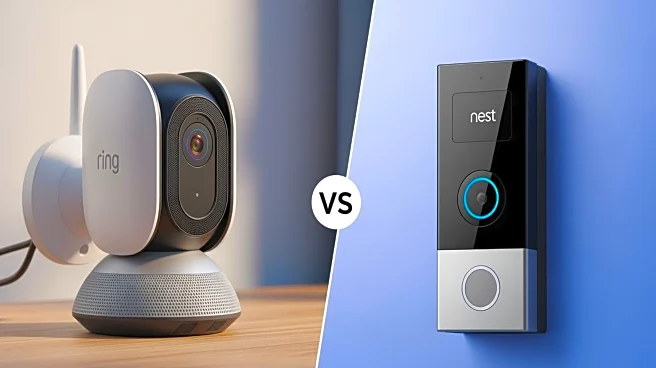What's Happening?
The competition between home security camera companies Ring and Google Nest has intensified with recent hardware releases and AI upgrades. Both companies have introduced new features in their respective AI systems, Gemini for Home and Alexa Plus, as of
October 2025. Ring, owned by Amazon, has launched new 2K and 4K cameras, enhancing its product line with more AI capabilities. These include descriptive smart alerts and object recognition, although many features require a subscription. Google Nest, on the other hand, has released its third-generation cameras with 2K resolution and expanded its Gemini for Home AI features, offering free package and person detection. However, advanced features like face detection require a subscription. The choice between Ring and Nest largely depends on the user's existing smart home ecosystem, with Ring being more compatible with Amazon Alexa and Nest integrating well with Google Home.
Why It's Important?
The advancements in AI and smart home technology by Ring and Nest reflect a growing trend in the home security market towards more integrated and intelligent systems. This competition is significant for consumers as it drives innovation and potentially lowers costs through competitive pricing. For Amazon and Google, these developments are crucial in maintaining and expanding their foothold in the smart home market. Consumers stand to benefit from improved security features and more options tailored to their specific smart home setups. However, the reliance on subscriptions for advanced features may impact consumer decisions, as ongoing costs could deter some users. The focus on AI also raises privacy concerns, as these systems often require data sharing with the companies for functionality.
What's Next?
As both companies continue to develop their AI capabilities, further enhancements in smart home security features are expected. Ring plans to introduce more advanced facial recognition and AI-driven features like Alexa Plus Greetings. Meanwhile, Google Nest is likely to expand its Gemini for Home offerings, potentially improving doorbell greetings and other AI functionalities. The ongoing competition may lead to more frequent updates and new product releases, keeping consumers engaged and potentially attracting new users. Additionally, the companies may face increased scrutiny over data privacy and security, prompting them to enhance their privacy measures and transparency.
Beyond the Headlines
The competition between Ring and Nest highlights broader trends in the tech industry, such as the integration of AI into everyday devices and the shift towards subscription-based models. This shift has implications for consumer privacy, as more data is collected and stored by these companies. The ethical considerations surrounding AI and data usage are likely to become more prominent as these technologies become more pervasive. Furthermore, the rivalry between Amazon and Google in the smart home market could influence other tech companies to innovate and expand their own smart home offerings, potentially leading to a more diverse and competitive market.














